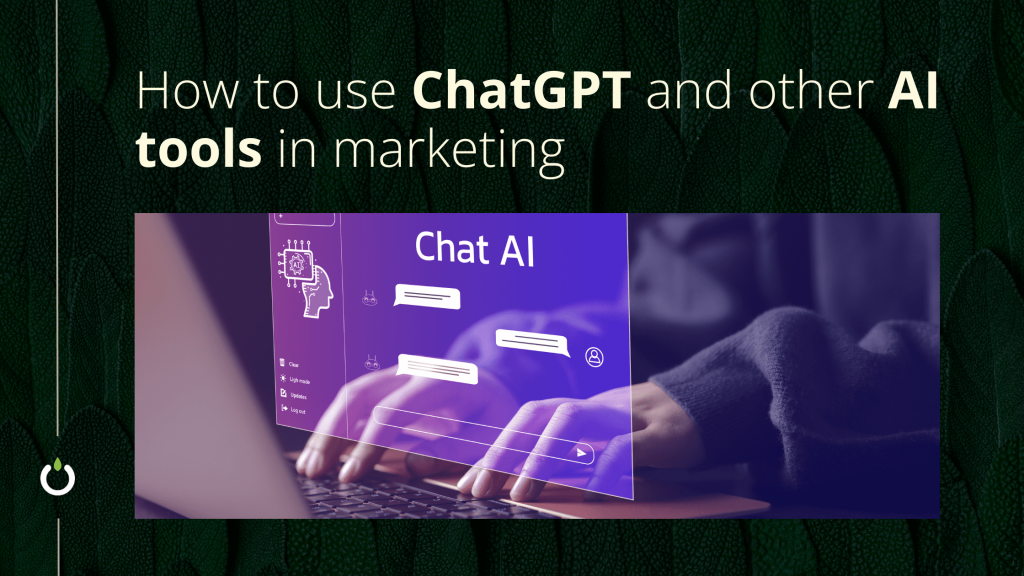How to use ChatGPT and other AI tools in Marketing: a practical guide + examples

Artificial Intelligence (AI) has started to play an increasingly important role in current marketing strategies, offering innovative solutions for the dynamic challenges of the digital landscape, just a prompt away.
As Onlike specialists, we cannot afford to fall behind, so we have explored in real time what new technologies offer, and specifically, how chatbots and AI models can aid us in marketing. Today, we share with you a practical and applied perspective on how to leverage these resources—from the actual tools and working methods to the ethics and responsibility behind their use, all presented in accessible terms and with examples from our experience, to make you comfortable using them in your activities.

AI Tools for marketing: how not to fall behind
We start with the basics: understanding and using AI tools. ChatGPT, a chatbot developed by OpenAI, is the most well-known example—and rightfully so, it’s remarkable, providing support for content generation, marketing ideas, and even responses to customer questions. Recently, you can interact with it using voice and images, upload entire PDFs to ask specific questions from them, provide links for research, and request article or course summaries, becoming a reliable ally not just in work, but in any learning effort. Paired with Zapier, a tool that automates workflows between apps, you can integrate ChatGPT to optimize email campaigns, manage social networks, and much more.
Tips & Tricks:
Create specific and as complex prompts as possible for ChatGPT, aligning with your brand’s tone and style. Experiment with different prompt structures to discover the most effective approaches for generating unique content. The more unique elements you include, the more successful, authentic, and valuable the result will be.
For example, it’s not the same to say: “Please generate a blog article about the importance of digital marketing for small businesses” or “Please generate an 800-word blog article, in the conversational and optimistic style specific to our eco-friendly lifestyle brand, highlighting the importance of sustainable choices in everyday life. Include concrete examples of simple, yet effective daily actions our readers can adopt to reduce their carbon footprint, as well as how our products naturally integrate into this lifestyle. Use accessible language and insert rhetorical questions to encourage interaction in the comments section. I want to foster a sense of community and mutual support between us and our readers.”
Which do you think would yield better results?
P.S.: Yes, we are always respectful to AI models, saying “please” and “thank you”. You never know.
Artificial intelligence in branding
Artificial intelligence can play a crucial role in developing a brand and its visibility. Tools like Jasper or Writesonic can generate naming ideas, slogans, or brand stories, aiding in creating a cohesive and attractive brand identity.
Practical application:
Use AI to test different name variants or to create a strong and coherent narrative around your campaigns. Analyze your audience’s reactions and adjust your strategy accordingly. However, AI capabilities do not replace your expertise, efforts, and involvement—you will have to do the research work, know well who you are addressing, who your audience, customers, and competitive advantages are, to correctly ask for AI assistants’ help and get something relevant from them. If you need help, we are here for you! Learn more about our team’s processes!
Content marketing enhanced with AI
For content marketing, chatbots offer solutions for generating article ideas, copywriting, and even presentations. Tools like Surfer SEO can help optimize content for search engines, ensuring your content marketing efforts are optimized and relevant to your target audience.
Strategy:
Use AI to generate drafts of articles, then personalize and refine the content to reflect your brand’s voice and personality. If you’re feeling uninspired, you can use paraphrasing and rephrasing tools to refresh existing content—however, we warn again that all have limitations and must be used responsibly and intelligently. If you address your audience the same as everyone else in the market, the effect will be clear—with the loss of authenticity, own tone, and real efforts in your relationship, you will also lose the race sooner.
Generative AI in design
In design, tools like DALL·E and Midjourney are changing the game, offering the ability to create impressive images and visual materials from text descriptions. These tools can turn abstract ideas into concrete visual representations, opening new horizons in creating visual content for marketing campaigns—even if you have no experience in the field.
Usage Ideas:
Experiment with generating images for social media posts or promotional materials, using specific keywords related to your campaigns. Don’t get caught up in generalities and use your own, complex, and unique tone—just as with texts.
AI in Social Media Marketing
Artificial intelligence is transforming how we approach social media marketing, from ideation to the automatic posting of posts. Tools like Buffer or Hootsuite integrate automatic functions to optimize post scheduling and analyze content performance.
Tip:
Implement a workflow that combines AI-generated content with performance analysis of posts to quickly adjust social media strategies. Don’t forget to “listen” to what your audience wants and offer them what they want to see and read more often!
Using AI in paid campaigns (Ads)
For paid campaigns on platforms like Facebook, Instagram, or Google Ads, AI can help optimize texts and images. Tools like AdEspresso can be used to test different ad versions and identify the most efficient approach for you. Soon, Google will offer its own model to assist in ad creation, simpler than ever—you’ll just need a bit of inspiration, a coherent set of objectives, and an accurate budget, and it will do the rest of the work. How well? Remains to be seen.
Application:
Experiment with generating scripts for video ads or text for TikTok using AI, to step out of your “comfort zone” and capture attention in new and creative ways.
Email marketing optimized with AI
In email marketing, AI tools can be used to personalize email subjects and content, increasing open and conversion rates. Tools like Mailchimp integrate AI-based functions to segment the audience and personalize messages.
Strategy:
Use AI to create personalized subject lines and email content based on the behavior and preferences of your users—don’t necessarily get inspired by what others are doing, but convince yourself what works for you.
SEO enhanced with AI
For SEO, tools like Clearscope or MarketMuse offer detailed content analyses, suggesting improvements based on current search algorithms. These tools can help identify relevant keywords and structure content for better online visibility. Wait, do you know how to apply SEO? Here’s a short guide from our specialists.
seo in a nutshell: how to win in the digital world
What to do concretely:
Use AI tools to guide your content strategy, ensuring articles are SEO optimized and, most importantly, respond to the relevant users’ intentions. But if you need help and want to know exactly how your site is performing SEO-wise, ask for an audit now!
Yes, integrating AI into marketing strategies not only streamlines processes and saves resources but also opens new possibilities for creativity and personalization. As specialists, we encourage the adoption of these innovative technologies to stay ahead in digital marketing trends. However, we believe it’s essential to discuss…
Where’s the limit? The ethics of using artificial intelligence in marketing campaigns.
In implementing AI technologies in marketing strategies, ethics play a crucial role—especially in the absence of concrete regulations. Responsible use of artificial intelligence requires a deep understanding of the impact technology can have on consumers and society as a whole. It’s crucial to ensure that AI is used to improve user experiences while respecting their privacy and personal data.
Transparency and confidentiality:
A fundamental ethical aspect is transparency in the use of AI. Consumers must be informed about how and when their data are used in automated marketing campaigns. Respecting privacy and data protection regulations, such as GDPR, is essential to build and maintain consumer trust.
Avoiding bias/discrimination:
AI relies on data to learn and make decisions. Therefore, it’s extremely important to ensure that the data sets we provide are not biased, thus avoiding the perpetuation of stereotypes or discrimination in marketing campaigns. Special attention should be paid to diversity and inclusion in the algorithms and models used.
The role of the marketing specialist:
Artificial intelligence offers powerful tools, but the success of marketing campaigns still depends on human creativity, strategy, and intuition. As marketing specialists, our role is to guide the use of AI, ensuring that technology supports marketing objectives in an ethical and responsible manner. Our team is not just a group of professionals; we are your allies, accomplices, and guides in this adventure.
The marketing specialist remains the brain behind operations, bringing fresh air, personality, and soul to campaigns. AI technology can assist in redundant tasks and those involving large amounts of data, summarizing information, providing structure, and generating ideas, but the narrative, strategy, and final decisions belong to humans.

Improving communication with AI:
To communicate effectively with new models, you need to learn a bit more—or, at least, possess a good set of soft and hard skills—starting from a rich vocabulary and advanced communication abilities, which allow you to request what you wish to obtain. While technical knowledge is useful, the ability to formulate clear prompts and interpret the results provided by AI is essential.
In conclusion, using AI in marketing opens extraordinary possibilities. However, we must approach this technology with our eyes wide open, respecting the rights and expectations of our audience. The marketing specialist remains the central element in this ecosystem, using AI as a tool to enhance efforts, but maintaining control over the direction and values of campaigns. In this dance between human and machine, balance and collaboration are the keys to success, allowing us to use AI in a way that enriches and humanizes marketing strategies.
If you want to learn more, one-on-one, contact us, you know where to find us—always as informed and enthusiastic when it comes to new trends, strategies, and technologies.
